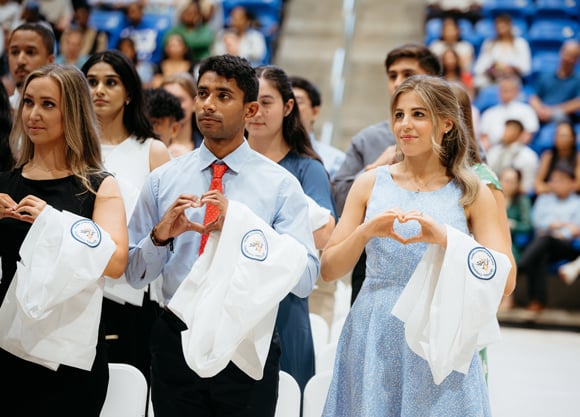
Newest School of Medicine students urged to be 'driven by your vision of humanity'
August 12, 2024

August 12, 2024

Selected from a pool of 7,341 applicants, the Class of 2028 represents 25 states and 62 unique undergraduate universities. Among them are 21 first-generation college students, 12 Connecticut residents, 13 students hailing from outside the U.S. and four military veterans.
Together they were officially welcomed into an exclusive and critically important club, a theme of the keynote address given by Dr. Dowin Boatright, vice chair of research for the Department of Emergency Medicine at the New York University Grossman School of Medicine.
“There are a lot of clubs in our society but this is an extremely difficult one to get into for a variety of reasons, and I think we all know what those are,” said Boatright, who was introduced by his wife, Dr. Renu Boatright, assistant dean for student affairs at Quinnipiac Netter. “To get here, you had to demonstrate tremendous talent, tremendous intellectual ability. But that was only a small component of why you’re here today. I think the key element that we want to celebrate today as you enter into this profession is your humanity.”
Dr. Dowin Boatright reflected on his own White Coat ceremony 21 years ago, a day when his mother, a first-generation college student, army veteran and pioneering pediatrician in Nashville, Tennessee, was the first to welcome him into a “timeless profession” in which “every day you have the opportunity to save someone’s life, but also improve the quality of life for a population.”
He added: “Membership to this profession also has dues, just like any club. The key responsibility is the responsibility to lead. We have a wonderful profession, but it has changed over time. … We will depend on you to have the vision, the courage and the leadership to help this profession and help society evolve. You will be driven by your vision of humanity and the humanistic care you want to provide.”
Before they slipped on their white coats, draped their new stethoscopes over their shoulders and stepped up to the podium to introduce themselves to a hearty crowd of family and friends, the first-year students were led in a less formal exercise by Dr. Phillip Boiselle, dean of the Frank H. Netter MD School of Medicine, who closed his remarks by making the hand-heart gesture and sharing “three connected elements of compassion that are visually represented in the heart shape — compassionate care for the patient in front of you, collegial compassion for the healthcare team that surrounds you and compassion for yourself.”
“Our school’s commitment to fostering humanistic healthcare is rooted in the art of our namesake, the renowned medical illustrator, Dr. Frank H. Netter,” Dean Boiselle said. “What set Dr. Netter apart from previous masters of anatomical illustration is the compassionate way in which he illustrated disease processes as life challenges faced by individual patients. To our students, as you enter the profession of medicine today, you are part of the Netter legacy of humanism and compassion.”
Dr. Lisa Coplit, senior associate dean for faculty affairs, retraced the history of white coats, a symbolic sartorial choice that dates back to the late 19th century, before which physicians, like clergy members, were always clad in black. She encouraged the students to savor this first step in forming their professional identity before faculty members took the stage to assist with the cloaking of the class. Dr. Adam Weinstein, assistant dean for clinical curriculum, then led the students in reciting the Frank H. Netter MD School of Medicine Physician’s Pledge.
The student address was given by fourth-year student Kevin Ly, a representative of the Class of 2025 and the Gold Humanism Honor Society. After opening with a humorous reference to the long-running, hospital-based TV drama “Grey’s Anatomy,” Ly urged his new classmates to lean on each other as they embark on an arduous yet rewarding journey.
In truth, the journey started long before they walked the stage on Friday, he said.
“Your practice in medicine began when you began to care for others,” Ly said. “It’s taking the time to understand the person in front of you, the stories they bring with them and the values they care about. Medical school will equip you with the scientific knowledge to get to the next level, but the art of practicing medicine happens way before then. Today, your journey as a doctor continues.”
Since welcoming its inaugural class in September 2013, the Netter School has sent over 600 alumni into the medical profession under a banner of patient-centered and compassionate care. U.S. News & World Report ranks the medical school among the top 10 schools nationally for its percentage of graduates practicing in rural areas and among the top 50 in primary care medical education.
Quinnipiac Today is your source for what's happening throughout #BobcatNation. Sign up for our weekly email newsletter to be among the first to know about news, events and members of our Bobcat family who are making a positive difference in our world.
Sign Up Now